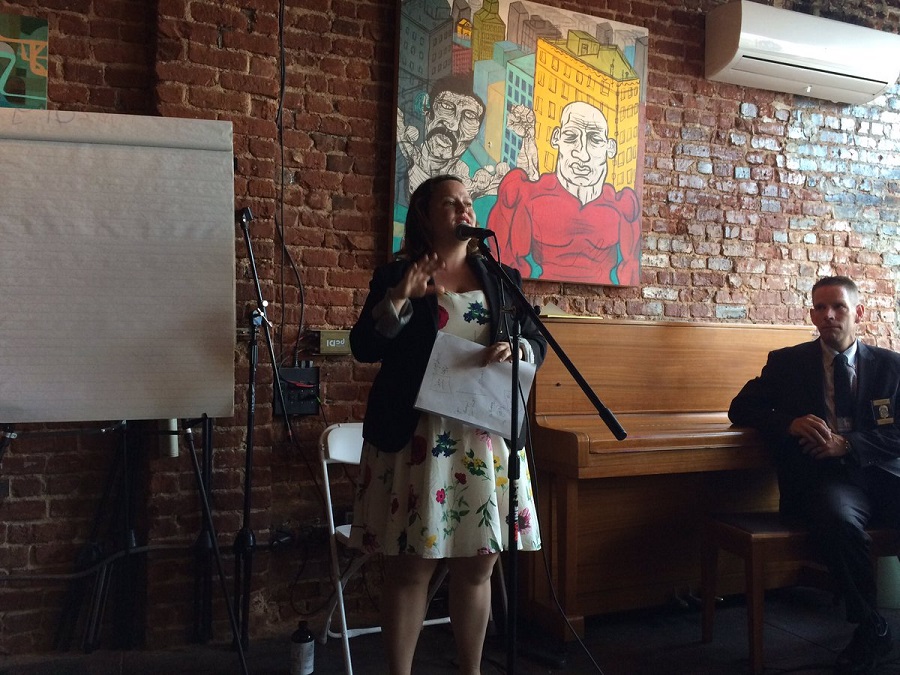
Councilwoman Jeannine Pearce talks during an Open Conversation event Tuesday night. Photo by Michaela Kwoka-Coleman.
Members of the Long Beach arts community gathered for an open conversation to discuss music and entertainment issues with Second District Councilmember Jeannine Pearce Tuesday night at 4th Street Vine on Retro Row.
Hosted by Pearce, along with the Arts Council of Long Beach and the Long Beach Music Council, topics included zoning issues, conditional use and entertainment permits, base codes and even affordable housing.
Pearce praised the role of music in people’s lives, crediting reggae music with being the only means by which she could get her daughter to fall asleep as a baby.
“Music, often, is that thing we learn very early on,” she said. “Before our kids speak, we’re singing to them… if it wasn’t for music, I would have lost my mind when my kid was a newborn.”
While community members took turns expressing their opinions on what the city needs to do to encourage the music and arts scene in Long Beach, aids from Pearce’s office took notes on an easel pad.
Stan Dewitt of the Long Beach Music Council conveyed three recommendations that his group proposed to the mayor’s office a few weeks ago.
The first, he said, is to change a line of text in city code which prohibits any coffee houses or restaurants from being able to “provide simple, low-volume music to customers.” Next, the group proposed to rework the permitting process for music venues, specifically in regards to conditional use permits, which many throughout the night criticized.
Lastly, Dewitt asked the city to completely revamp the rules regarding street performing, including “clear rules and regulations, the creation of low cost permits and designated street performing zones in the city.”
A conditional use permit allows a businesses or recipient to conduct specified activities, such as selling alcohol, as allowed by the conditions of the permit which are granted by the city Planning Commission. The permits are only granted after the commission has determined that the nature of activities will not harm the surrounding community.
Entertainment permits are required before a business can conduct any entertainment activity within city limits, such as installing a dance floor.
The cost to apply for the permits vary by building capacity, what entertainment a business wants to have, etc., but those at Tuesday night’s conversation said they spent between $8,000 to $10,000 per permit.
The Long Beach Music Council has been working with an aspiring all ages venue called Toxic Toast in Downtown Long Beach. Currently, there is no all ages venue in Long Beach, but representatives from the music council said the city has been very open to creating an all ages venue and has been using Toxic Toast as a case study.
“We don’t have one all ages venue in all of Long Beach, and we know that’s an important thing to have for young people to have a place to go,” a Long Beach Music Council member said. “And the one thing we’ve talked about is any time we lose a venue, either one has to go out of business or one doesn’t get approval, a little bit of the music scene dies.”
During the public comment period, community members brought up the issues of parking and affordable housing, saying that people won’t go to shows if they have to give up their parking spot and that artists are having to move out of the city because they can’t afford the cost of living anymore.
“No one will even want to go to a show if they have to give up their parking spot” (parking seems to work its way into every issue here)
— Michaela Kwoka (@newsmichaelakc) April 26, 2017
Pearce said that the issues of art and affordable housing are interconnected. Currently, the housing vacancy rate in Long Beach is 2 percent and a normal rate is 8 percent.
Keeping musicians and artists in Long Beach is high priority, Pearce said. She encouraged all those in the art community to show up the the May 2 city council meeting, where the affordable housing study session will be making recommendations to city council.

